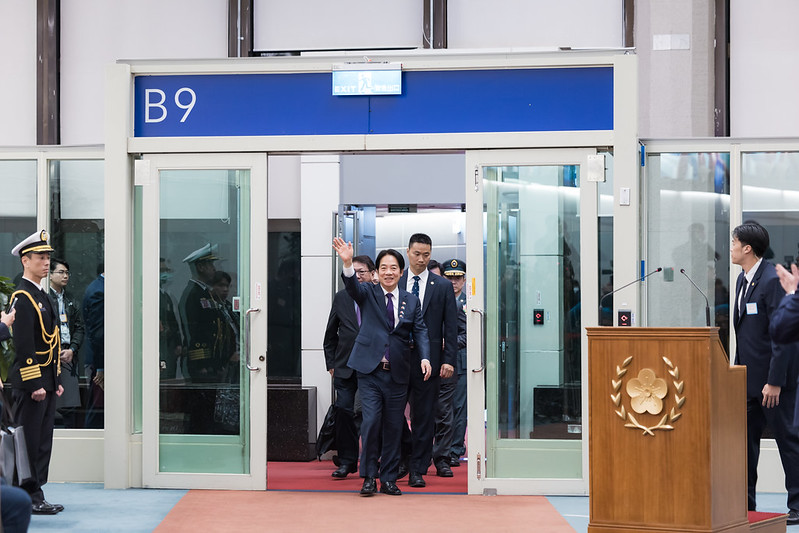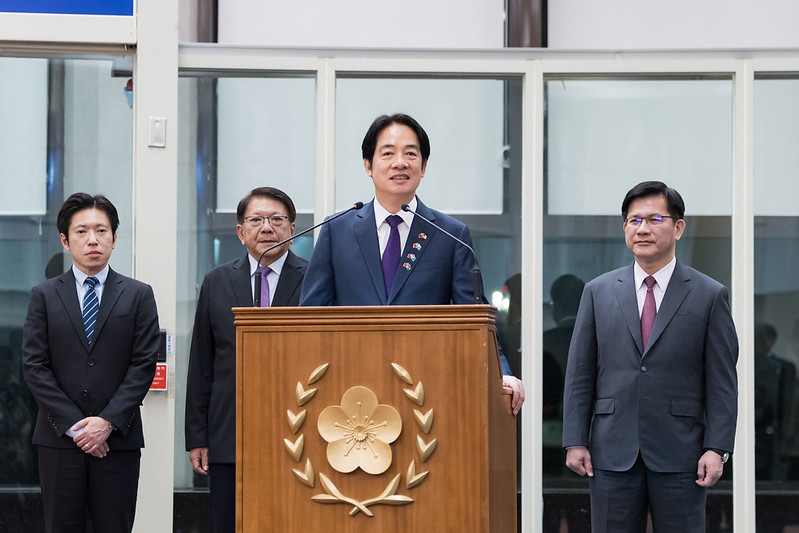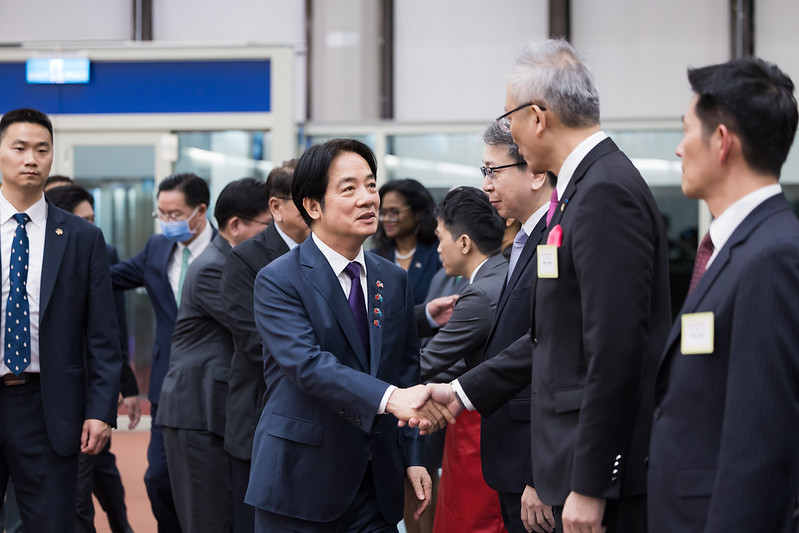News & activities
 News releases
News releases
On the evening of December 6, President Lai Ching-te returned to Taiwan after the conclusion of his state visits to the Republic of the Marshall Islands, Tuvalu, and the Republic of Palau, and delivered remarks on his visit at Taoyuan International Airport. In remarks, President Lai reported on the achievements of the trip, which included deepening of friendships with diplomatic allies, the launch of a new era of values-based diplomacy, and the consolidation of overseas support for Taiwan. The president emphasized that so long as we defend democracy, deepen democracy, and uphold the universal values of democracy as we engage with other countries around the world, we can certainly garner more support, not only defending Taiwan, but also maintaining regional peace and stability.
In remarks, President Lai first told the people of Taiwan that everyone in the delegation, including the members of the traveling press corps, all returned home safely, and that the seven-day, six-night trip is now complete. He again thanked the government of the United States for providing assistance based on the principles of safety, dignity, comfort, and convenience, which helped the trip proceed smoothly and successfully.
President Lai thanked national security and diplomatic staff for their careful advance arrangements and detailed communications, mentioning in particular the details of the visit worked out by front-line personnel from the overseas representative offices and thanking them for the hard work. He also thanked the China Airlines crew members for providing safe and comfortable services that enabled the delegation to rest well despite the packed schedule.
The president then thanked the members of the traveling press corps for updating Taiwan on the trip’s latest news, working late into the night and sometimes going as long as 40 hours without sleeping, which was impressive. The president expressed hope that the press corps members’ employers would provide appropriate rewards and said he looked forward to traveling with the press corps again to visit Taiwan’s allies in the future.
President Lai reported to the people of Taiwan on the achievements of the trip. The first, he said, is that we deepened friendships with diplomatic allies. The delegation received enthusiastic welcomes from the people of the Marshall Islands, Tuvalu, and Palau. President Lai thanked President Hilda C. Heine of the Marshall Islands, Prime Minister Feleti Teo of Tuvalu, and President Surangel S. Whipps, Jr. of Palau for their warm hospitality and staunch support for Taiwan. He noted that Taiwan shares an Austronesian cultural heritage with those three countries, and that during the trip he strongly felt that it makes us all like family.
Second, said the president, is that we have launched a new era of values-based diplomacy. During this trip, he said, he saw that cooperation between Taiwan and the three diplomatic allies had yielded tangible results in such areas as public health, food security, climate change, digital transformation, and maritime security. He expressed confidence that these results would further consolidate friendships with diplomatic allies. We are all aware, and international news organizations have published many reports, he said, that these diplomatic allies are bravely resisting the threats and enticements of authoritarian actors. These countries bravely and firmly support the universal values of democracy, which is an important reason why these three diplomatic allies stand unwaveringly with us.
The president mentioned that during the trip his delegation and the governors and legislatures of Hawaii and Guam affirmed their shared commitment to democracy. He expressed his belief that democracy is Taiwan’s most precious asset, one that we have only through the lifelong devotion of a succession of democracy activists. Nationwide solidarity, he said, has made Taiwan a beacon for democracy in Asia. Moving forward, he added, we will continue to use the universal values of democracy, freedom, and respect for human rights to further engage in diplomacy with the world’s democracies. He emphasized that in this way we can achieve mutually beneficial situations with prosperity and development for all sides while we jointly combat expanding authoritarianism.
And third, the president said, is that we have consolidated overseas support for Taiwan. He thanked all the overseas community members, not only those living in the places he visited, but also those who traveled from other locations to where his delegation was visiting. Everyone gathered together and cheered for Taiwan, he said, and expressed their intent to contribute even more for Taiwan. As president, he said that he is moved by this support and that he is proud of the overseas community.
President Lai then thanked the US, including the governor of Guam for inviting him and his delegation to breakfast, when the national anthems of Taiwan and the US were both played and sung at the governor’s house, clearly expressing strong support for Taiwan. Noting that the Guam Legislature had passed resolutions backing Taiwan for four consecutive years, the president said he was honored to receive a copy of the most recent one on behalf of the people of Taiwan. President Lai also thanked the governor of Hawaii for enthusiastically supporting his delegation. The Hawaiian State Legislature, he said, presented him a gift of the US flag and the Hawaii state flag, which he accepted on behalf of the people of Taiwan. This shows, he remarked, that not only do our diplomatic allies stand firmly with us, but that in our partner the US, Taiwan enjoys bipartisan support in Congress as well as strong support at the local level in such places as Hawaii and Guam. He emphasized that all of this shows that Taiwan has successfully consolidated overseas support for Taiwan.
President Lai said that Taiwan will continue doing all it can, adding that “the virtuous never stand alone.” So long as we defend democracy, deepen democracy, and uphold the universal values of democracy as we engage with other countries around the world, we can certainly garner more support, not only defending Taiwan, he emphasized, but also maintaining regional peace and stability.
In closing, the president thanked the national security team, led by National Security Council Secretary-General Joseph Wu (吳釗燮), and the Executive Yuan team, led by Premier Cho Jung-tai (卓榮泰), for professionally attending to many domestic and international issues during his trip, ensuring the stability of our society and keeping the government running smoothly.
Belizean Ambassador Candice Augusta Pitts, in her capacity as secretary-general of the diplomatic corps, Palauan Ambassador David Adams Orrukem, and Tuvaluan Charge d’Affaires a.i. Silafaga Lalua O’Brien were present at the airport to welcome the president upon his return.











